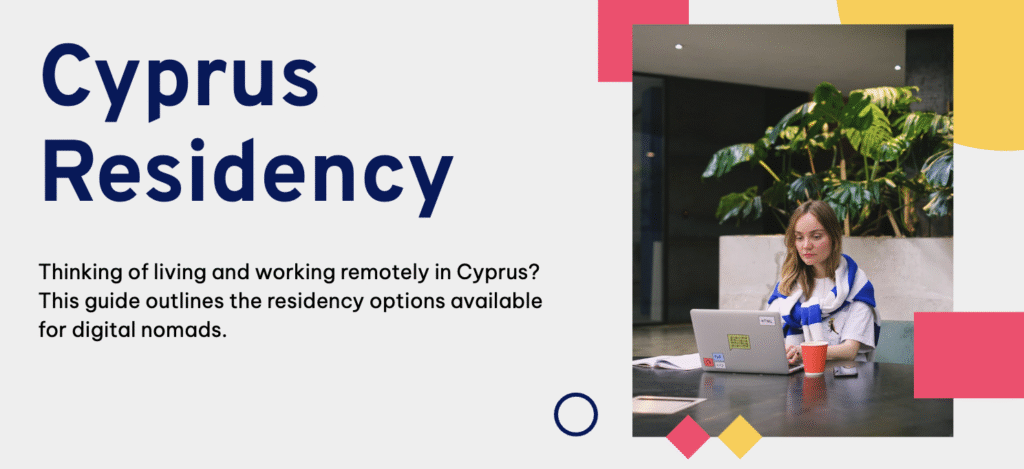Table of Contents
ToggleIntroduction to Cyprus Residency for Remote Workers

The rise of remote work has prompted many countries to create appealing residency options for digital nomads, and Cyprus is increasingly gaining attention. This Mediterranean island, known for its picturesque landscapes and rich cultural heritage, offers a unique combination of professional opportunities and a relaxed lifestyle.
The initiative for Cyprus residency for remote workers is tailored to attract professionals who work for companies based abroad or are self-employed with an international clientele.
This residency option aims to leverage the island’s strategic location, connecting Europe, Asia, and Africa, making it a convenient hub for global business activities.
Cyprus provides a supportive environment for remote workers, featuring reliable internet connectivity, modern coworking spaces, and a friendly local community.
Major cities such as Nicosia and Limassol are well-equipped with facilities that cater to the needs of digital nomads.
Additionally, the relatively low cost of living compared to other European countries makes Cyprus an economically viable option.
Residents can enjoy a high quality of life, with access to beautiful beaches, historic sites, and vibrant cultural events.
For those considering making Cyprus their new home base, the country’s residency options are designed to be straightforward yet comprehensive.
Prospective residents must meet specific eligibility criteria and complete the necessary legal formalities, ensuring a transparent and efficient process.
Cyprus’ commitment to providing an ideal setting for remote work, combined with its appealing lifestyle benefits, positions it as a top destination for digital nomads.
Legal Framework for Obtaining Cyprus Residency

Applicants seeking Cyprus residency as digital nomads must meet specific criteria. They need to prove they work remotely for a foreign-registered company or are self-employed with clients outside Cyprus.
Key documents include proof of employment, income statements, a clean criminal record, and health insurance valid in Cyprus.
Additionally, applicants must show they have enough financial means to support themselves during their stay. The application is submitted to the Civil Registry and Migration Department, where it undergoes a review process before residency is granted.
The legal framework also requires applicants to maintain their remote work status and adhere to local laws.
Failure to comply with these regulations could result in the revocation of residency status.
It’s crucial to consult with immigration experts familiar with Cyprus laws to ensure a smooth application process and ongoing compliance.
Applicants should also be aware of the documentation required for family members if they wish to relocate together.
Each family member must have their documents, including health insurance and proof of relationship to the primary applicant.
This comprehensive approach ensures that the residency process is transparent and efficient, making it easier for digital nomads to transition to their new life in Cyprus.
Understanding these legal requirements is essential for a successful residency application. Careful preparation and adherence to the guidelines set forth by the Civil Registry and Migration Department can facilitate a smooth transition to life as a digital nomad in Cyprus.
Tax Implications for Digital Nomads in Cyprus

Understanding the tax obligations is crucial for digital nomads considering Cyprus as their base. Generally, individuals residing in Cyprus for more than 183 days a year are considered tax residents and are subject to the local tax regime. The personal income tax rates in Cyprus range from 0% to 35%, depending on the income level.
However, Cyprus offers several tax benefits, such as a 50% tax exemption on income exceeding €100,000 for the first ten years of employment, applicable to individuals relocating to Cyprus.
Cyprus also has double tax treaties with many countries, which help prevent the double taxation of income. This is particularly beneficial for digital nomads who might have tax obligations in their home country. Social insurance contributions are also required for residents, which cover various benefits including healthcare and pensions.
It’s important to note that Cyprus has a VAT (Value Added Tax) system, and depending on the nature of your business, you may be required to register and charge VAT on services provided.
Consulting with a tax professional who understands both the local and international tax landscape can help you navigate these complexities. Proper planning and advice can ensure that you make the most of the tax advantages available while remaining compliant with all regulations.
Quality of Life and Infrastructure in Cyprus

Cyprus offers a high standard of living that appeals to digital nomads. The cost of living is manageable, with affordable housing and everyday expenses that are lower compared to many European countries.
The island enjoys a Mediterranean climate, offering sunny days and mild winters, making it perfect for year-round outdoor activities. Residents have access to beautiful beaches, diverse cuisine, and a rich cultural history.
The country is equipped with robust internet connectivity, with high-speed broadband available in most urban and suburban areas. This makes remote work seamless and efficient.
For those who prefer a dedicated workspace, there are numerous coworking spaces in cities like Nicosia and Limassol, featuring modern amenities and the chance to network with other professionals.
Public transportation is reliable and relatively inexpensive, although having a car can make it easier to explore the island.
Healthcare in Cyprus is of high quality, with both public and private options available. The public healthcare system is affordable, and private healthcare is also accessible and efficient.
Cyprus is a safe country with a low crime rate, and the local community is known for being friendly and welcoming.
There are plenty of activities to engage in during off-work hours, from visiting ancient ruins to enjoying water sports, hiking, and participating in local festivals.
The blend of professional opportunities and lifestyle perks makes Cyprus an attractive option for remote workers.
Is Cyprus Good for Digital Nomads?

Cyprus provides an inviting environment for digital nomads with its excellent work-life balance and numerous recreational opportunities. The local community is not only friendly but also includes a growing network of remote workers and entrepreneurs. This community offers various events and networking opportunities, fostering collaboration and the sharing of experiences.
The island’s natural beauty, including stunning beaches and scenic landscapes, combined with a rich cultural history, offers plenty to explore during leisure time.
Public transportation is reliable, and while having a car can enhance mobility, it’s not a necessity for getting around.
High-speed internet and modern coworking spaces in cities like Nicosia and Limassol make remote work convenient and efficient.
The healthcare system is robust, offering both public and private options to residents.
Additionally, the cost of living is manageable, allowing digital nomads to enjoy a comfortable lifestyle without excessive expenses.
Safety is another significant advantage, as Cyprus has a low crime rate, making it a secure place to live and work. The island’s Mediterranean climate ensures pleasant weather year-round, perfect for outdoor activities and relaxation. Overall, Cyprus’s combination of professional and lifestyle benefits makes it a highly appealing destination for digital nomads.
Legal Considerations and Advice

Navigating the legal landscape is crucial for anyone considering Cyprus residency as a remote worker.
Ensuring compliance with local tax laws, maintaining proper health insurance, and meeting the residency requirements are vital steps.
Legal obligations include submitting accurate income statements, proof of remote work status, and maintaining adequate financial means.
Additionally, understanding the implications of double tax treaties can prevent unforeseen tax liabilities.
It is highly recommended to engage with legal experts specializing in Cypriot immigration and tax law.
These professionals can offer tailored advice and assist with the necessary paperwork, ensuring that applications are thorough and accurate.
They can also provide ongoing support to help residents maintain compliance with all relevant regulations.
Family members relocating with the primary applicant must also meet specific legal requirements, such as providing health insurance and proof of relationship. Thorough preparation and understanding of these requirements can simplify the process and avoid legal complications. By securing professional advice and diligently adhering to the legal framework, digital nomads can enjoy a smooth transition and a successful stay in Cyprus.
Conclusion: Making the Move to Cyprus
Making the move to Cyprus as a digital nomad is a well-considered decision, thanks to the country’s unique combination of professional and lifestyle benefits. The island’s strategic location offers easy access to multiple continents, which is advantageous for those involved in international business. Reliable high-speed internet and modern coworking spaces ensure that your work setup remains efficient and productive.
The relatively low cost of living, compared to other European nations, allows digital nomads to enjoy a comfortable lifestyle without breaking the bank. Additionally, Cyprus’s favorable tax regime, including the 50% tax exemption on income exceeding €100,000 for the first ten years, is particularly attractive for those relocating. Double tax treaties further enhance the financial appeal by preventing double taxation.
Safety and healthcare are also significant factors, with Cyprus offering a low crime rate and robust healthcare options, both public and private. The island’s Mediterranean climate, coupled with its rich cultural history and beautiful landscapes, offers numerous recreational activities, ensuring a well-rounded life beyond work.
While the legal requirements may seem daunting, consulting with experts can simplify the process, ensuring compliance and smooth transition. Engaging with a supportive local community of remote workers and entrepreneurs can also make the move easier and more enjoyable. Overall, Cyprus presents a well-rounded option for digital nomads seeking a blend of professional and personal


